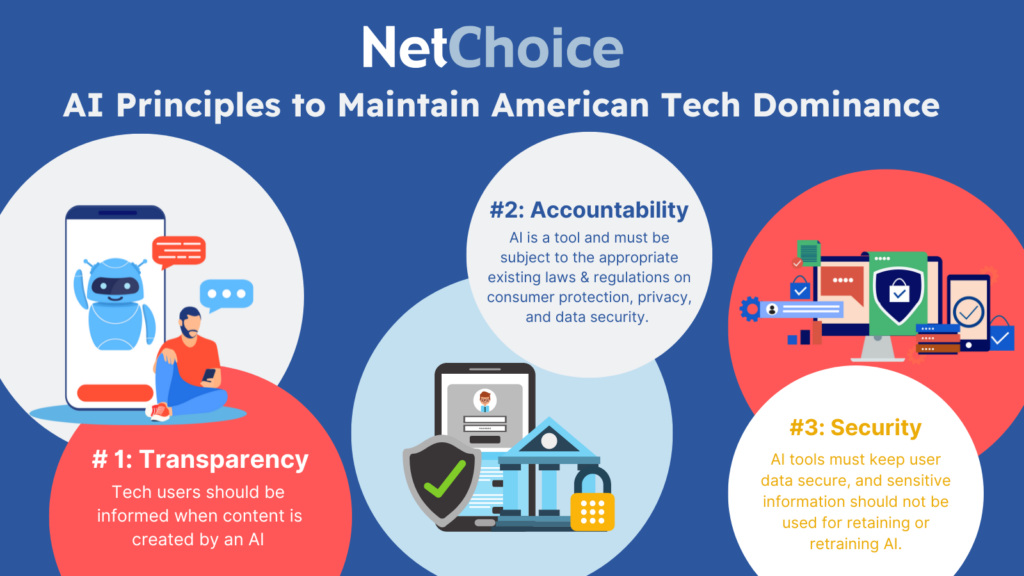Western governments must embrace artificial intelligence, not block it. Unfortunately, some in the United States and the European Union are trying to seize control over AI, raising concerns from experts about stifling the innovation and progress of this new and important technology.
A better path prioritizes transparency, accountability, and data security. This approach enforces existing laws related to issues like security, safety, and copyright, and avoids production of a new body of complex, overlapping, and burdensome laws.
Policymakers and industry must advance transparency, accountability, and security when it comes to AI.
- Transparency: Inform people when content is created by AI;
- Accountability: All laws apply to AI like they would any other tool; and
- Security: Data must be kept secure, and sensitive information should not be used for retraining of AI systems.

The West can’t pretend AI isn’t coming—it’s not a question of “if” but “where” the technology will be developed. And we should court AI developers to produce their tools here, based on western values of freedom, democracy and free markets. Biden and the EU must accept AI’s existence and embrace the opportunities and innovations made possible by AI tools.
At the same time, industry experts, technologists, and civil society should come together to foster a collaborative environment that respects diverse perspectives. Through transparency, these stakeholders can ensure that AI regulations remain open to innovation and do not favor the government’s preferred companies over others.
Rather than stifle AI innovation with excessive bureaucracy, regulators can hold it accountable through existing laws. Consumer protection, privacy, and data security laws already protect consumers against bad business practices, and these laws can still be applied to AI development.
By enforcing these laws effectively, policymakers can safeguard against algorithmic bias, discrimination, and unethical practices. Through accountability, the U.S. can strike a balance between innovation and societal well-being.
Data security must also be a top priority. The threat of AI being tricked into releasing private data that it was retrained on or AI being used to engage in cyber attacks is a legitimate concern. While there is a need to share data for AI training, developers must also implement robust measures to protect against unauthorized access and misuse.
Creating a national standard for privacy and data security will help to safeguard our sensitive information and uphold our rights. At the same time, the government must harden our critical infrastructure against cyber attacks. By prioritizing data security, policymakers can help AI serve us responsibly and ethically.
The idea of a “pause” on the development of AI denies us AI’s transformative benefits and hinders America’s ability to compete on the world stage. The alleged benefits of a “pause” only apply if all actors, good and bad, comply. This approach would hinder the development of AI by compliant good actors to the benefit of non-compliant bad actors like criminals and foreign adversaries.
A “pause” will also cause the U.S. to miss out on monumental opportunities presented by the technology. AI can benefit human wellbeing, from healthcare and transportation to energy optimization. It will assist industries in developing personalized medicine, efficient transportation systems, and sustainable energy solutions. Pausing AI would deny consumers these transformative benefits and impede progress in tackling pressing global challenges, while leaving concerns about AI unaddressed.
Policymakers must also consider the serious economic implications of stifling AI innovation. Generative AI is expected to add 7% to the world’s GDP (almost $1.1 trillion to the U.S. economy). Embracing AI and nurturing a competitive ecosystem for it to thrive is crucial for economic growth and job creation.
Through transparency, accountability, and data security, policymakers can help ensure that AI serves the best interests of society. By doing so, AI can be developed in a manner that balances open innovation with societal well-being and economic prosperity, and America can affirm our position as leaders in the global technological landscape, driving prosperity for our communities.
